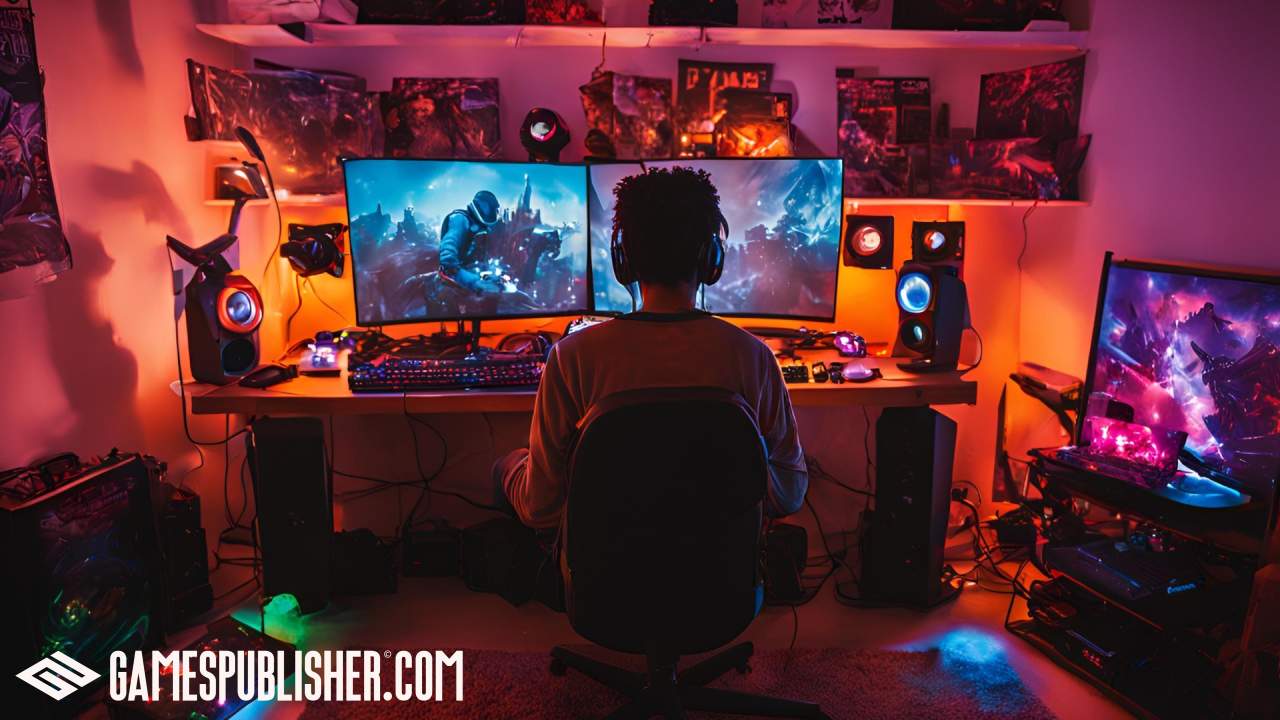Welcome to Gamespublisher.com – a hub for aspiring gamers, developers, and video game publishers!
In today’s digital world, video games have become increasingly popular, and by the end of 2025, there will be around 3.32 billion gamers worldwide.
As a result, playing games career becomes a common path that can help individual gamers turn their gaming passion into a sustainable job.
Moreover, the gaming industry is supported by esports, streaming, and content creation, making it a lucrative career for many gamers.
In this article, we’ll discuss how to turn your passion into a profession, where to start, the skills required, and how to succeed in a playing games career.
What Does a Playing Games Career Entail?
A playing games career is where you can earn money by doing things related to video games.
Whether you’re an esports athlete, streamer, YouTuber, game tester, or game developer, as long as your work relates to video games, you’re in a playing games career.
The video game industry has grown exponentially, making a career in gaming more viable than ever. By 2024, the gaming industry is estimated to make a whopping $455.27 billion.
Content creators are in high demand, and multiple platforms allow gamers to show their skills, entertain audiences, and monetize their passion.
Competitive gaming, or esports, has also surged, with exciting tournaments and professional players gaining sponsorships and global recognition. Let’s take Faker as an example!
Additionally, game testing and other jobs in the game publishing industry have become essential as more and more indie games come out each year.
Popular Professions and Paths
There are many professions and career paths in playing video games, each with its own benefits and challenges.
Below are the top 4 most popular professions you should consider.
1. eSports Professional Players

There are two prerequisites before entering competitive gaming and becoming an esports player:
- You must be good or even excellent at the game
- There is a tournament that organizes the game you’re good at
So, if you’re just a typical gamer who plays the game for fun and relaxing purposes, you might be unable to compete against the others.
Once you have the required skills, do a quick search to find if there are any tournaments for the game and register.
Some tournaments may only accept a team, while other titles may allow soloing.
If you don’t have a team, try to reach higher ranks in the game and maybe self-promote online through platforms and forums to get a chance to be a part of a team.
Once you have registered for a tournament, follow the rules and regulations and pay attention to upcoming matches.
To become an esports player, you need to train not only your skills but also your communication and collaboration skills, especially in a game that requires team play.
Some of the top esports titles are Dota 2, with a total prize pool of around $364 million; CS GO, with $162 million; and League of Legends, with over $115 million.
2. Streaming and Content Creation

Steaming and content creation are the second-best options for a playing games career, as they don’t require intense skills compared to esports careers.
You don’t need to train hard or look for a tournament or a team since you can start streaming independently.
Doing it alone means you get all the revenue.
However, to live stream and earn money or to become a content creator, you must be familiar with platforms like Twitch, YouTube, or TikTok.
You also need to learn many things, like how to stream correctly, set up the devices, record and edit videos, and a lot more!
Most importantly, your content must be fresh and stand out from the rest of the competition for growing opportunities.
Otherwise, you might be unable to compete with the other 12.3 million streamers and 207 million content creators worldwide.
Unlike esports players, where you can get income by playing in tournaments, you must meet the monetization requirements of the chosen platforms before getting any income.
For example, to be eligible for YouTube monetization, your channel must have over 1000 subscribers and 4000 hours of watch time in the last 12 months (or 10 million views of shorts in the previous 90 days).
3. Game Testing and QA (Quality Assurance)

A game tester or QA (quality assurance) is someone who plays the game to find glitches or bugs so that the tested game will be of the highest quality before release.
While all the steps in making a video game are equally important, game testing stands out the most as it ensures the best player experience.
To be honest, who cares if the game has bugs and is even unplayable, even though it has fantastic graphics and nice gameplay?
To find game tester jobs as a starting point, you must first be a gamer and enjoy playing video games since, most of the time, you will spend time doing so.
Secondly, you must be able to write and communicate clearly, as your main job requires a lot of back-and-forth communication.
Next, look for a job online and on game company websites.
Pay attention to special occasions, like before the holidays, since new games will most likely be released around those days. And you’ll have a higher chance of getting the job since more open opportunities exist.
According to ZipRecruiter, a game tester or QA makes around $64,000 – $66,000 annually.
For more information on the average salaries of different roles in the gaming industry, check out this “How Much Do Game Developers Make?” article.
4. Gaming Influencers and Collaborations

Influencers and collaborations are well-known gamers who play and talk about video games online. They tell people which game is good and fun, and people trust what they say.
Therefore, influencers usually get paid to promote video games or receive the game for free, creating a win-win situation.
To become an influencer, you need a decent number of followers (at least 1000) to get other brands and companies to notice you.
As you can see, the professions and paths in playing games career may overlap. By becoming a professional esports player or a streamer, you already have followers, which can also position you to become an influencer.
Skills You Need to Succeed
To succeed in playing games career, you should consider three skill categories as follows.
1. Technical Skills
Technical skills refer to the reflexes, strategic thinking, and a certain level of mastery of the gaming mechanics.
Enjoying playing video games is another thing, but knowing how everything in that game works is another level.
Games like League of Legends or Valorant are fast-paced, requiring you to focus while putting your reflexes to the max constantly.
Some other games, like Age of Empires or Starcraft, focus more on the strategy where you need to use your resources and time effectively to go ahead with your competitors.
Moreover, you need to constantly read the news and updates to keep up with the meta, especially with online games like League of Legends, as one strategy can be overpowered last year, but it may be terrible this year.
Overall, try to find your strengths and the type of game genre you love the most. Then, keep playing and training until you’re good at it to hone your technical skills.
2. Soft Skills
Soft skills are crucial in any career, and playing games career is not an exception.
No matter how good you are, if you’re in a team fight and can’t communicate well with your teammate, you’ll likely lose the match miserably.
You may prefer to become a solo pro gamer. That’s totally fine!

However, soft skills like networking and adaptability also play an essential role in helping you get to the tournaments and careers.
And if you’re planning to become a streamer or content creator, then communication skills are key since you need to engage with your audience a lot. Once your audience is happy, your career elevates.
Also, time management is another vital skill, especially if you’re solo, since you have to manage everything independently, from scheduling to video production and more.
3. Equipment and Setup
Besides technical and soft skills, you must also learn about the equipment and how to set it up for a seamlessly optimized gaming or streaming experience.
Whether you’re playing on PC devices or consoles, the setup is the first blocker you want to eliminate.
To choose the correct setup, ask yourself a few questions like:
- What type of game do I want to play?
- Am I aiming to become a professional player or a streamer/content creator?
- What is my available budget?
Knowing the answer to these questions will make picking suitable devices easier.
Typically, a full setup costs around $800 with average specifications.
If your goal is higher and the game you want to play requires intense graphics or fast-paced, then the cost can be up to $1,000 or even $2,000. This cost also includes the price of monitors and other peripherals.
Read More: The Best PC Setup for Indie Game Developers on a Budget
How to Start Your Playing Games Career?
Let’s learn the four main steps on how to start your playing games career!
1. Identify Your Niche
First, you must figure out which career path you want to take. Whether it’s esports, streaming, content creation, or game testing, you must love video games in general.
Then, use the table below to determine which profession you should choose.
| Professions | Focus | Key Traits | Ideal For |
|---|---|---|---|
| esports Player | Competitive gaming, mastering one game | Skill-driven, thrives under pressure | Those aiming to compete professionally. |
| Streamer | Live interaction, entertaining viewers | Engaging personality, consistent schedule | Those who enjoy real-time audience engagement. |
| Content Creator | Edited videos, storytelling, and reviews | Creative, skilled in video production | Those who like planning and crafting content. |
| Game Tester/QA | Testing games for bugs and improvements | Detail-oriented, analytical | Those who enjoy problem-solving in games. |
| Game Influencer | Promoting games and brands | Strong following, persuasive | Those who like sharing opinions and trends. |
Depending on your personality, skills, and type of game genre, you may find one career that suits your needs.
2. Join Communities and Platforms
Once you have identified your niche, it’s time to join communities and platforms to learn and start your career.
Being part of game communities or forums helps you a lot, as it allows you to seek online tournaments, content ideas, or jobs for gamers.
Moreover, you can also get valuable tips and tricks from the people in the communities, which can help you with your first steps.
Learning and trying the platforms is also crucial if you’re going for streaming or content creation.
You need to know how to use the platforms (for example, YouTube), upload videos, set up the channel, and more. There are a lot of things you need to learn.
3. Build Your Personal Brand
No matter which career path you choose, building your personal brand (or channel) is crucial to getting your dream playing games career.
It’s like building your CV for job interviews.
If your goal is to become an esports player, then you need to reach a high rank in that game, or you need to show your highlight clips so that others can see.

Streaming and content creation could be a bit less intense, as the moment you choose these paths, you’re continually building your brand.
Nonetheless, being a game tester or QA typically requires more qualifications, as you need to demonstrate experience or at least have a degree in IT or a related field.
There are plenty of platforms that allow gamers to build their portfolio, including social media, LinkedIn, or personal websites.
4. Monetization Strategies For Playing Games Career
To maximize your success in a gaming career, it’s essential to understand various monetization strategies.
Below is the list of monetization methods for each profession:
esports
- Tournament prizes
- Team sponsorships
- Brand endorsements
Streaming
- Donations and subscriptions
- Ad revenue
- Sponsored streams
Content Creation
- Ad revenue
- Sponsorships
- Affiliate marketing and merchandise
Game Tester/QA
- Salaried positions
- Freelance testing contracts
Game Influencer
- Brand deals and sponsored posts
- Affiliate links
- Exclusive content sales
Many successful gaming professionals combine several monetization strategies. For example, a streamer might also sell merchandise or run affiliate marketing alongside earning ad revenue.
By implementing these strategies and continuously engaging with your audience, you can turn your gaming passion into a sustainable career.
Challenges and How to Overcome Them
Although a career in playing games isn’t an 8-to-5 job, you must maintain a work-life balance.
Try to manage your screen time and take a break often; your body will thank you later.
Additionally, maintaining good mental health is crucial, as many gaming-related jobs can involve long hours and periods of working independently.
Another common challenge is the consistency and competition.
As more gamers enter the scene, you’ll need to find a way to stand out from the crowd. It’s also essential to stay up-to-date with trends to keep your audience engaged.
The gaming industry is unpredictable, which is why building steady income streams is crucial.
You never know what the future holds.
By diversifying your income streams and planning, you can weather unexpected changes and maintain consistent earnings.
Last but not least, maintaining a clear sense of purpose and staying connected to your passion for gaming can help keep your motivation high.
Read More: How To Get Into Game Development (10 Steps)
Success Stories: Inspiring Examples of Playing Games Careers
Many esports players have achieved incredible success.
For example, a legendary League of Legends player, Faker, is known for his skills and multiple championship wins.
Ninja started as an esports player before becoming one of the most famous streamers. Or Bugha, a young Fortnite player, won millions after claiming victory in the Fortnite World Cup.
Streamers and content creators like PewDiePie, Pokimane, and DrLupo have turned their passion for gaming into thriving careers.

PewDiePie is among the top 8 most-subscribed YouTubers through his gaming videos.
Pokimane is loved for her engaging streams and upbeat personality, while DrLupo inspires others with his charity streams and dedication to gaming.
Some individuals started in less glamorous roles but worked their way up.
Many game testers or QA specialists transitioned into game development or leadership roles in the industry.
Their stories show that every role in gaming can lead to bigger opportunities with hard work and dedication.
Conclusion
A playing games career offers exciting opportunities, from esports and streaming to content creation and beyond.
However, it also comes with challenges like staying competitive, maintaining balance, and building financial stability.
With dedication, the right skills, and a clear strategy, you can turn your passion for gaming into a fulfilling and rewarding profession.
For more tips, resources, and expert guides on building a successful gaming career, visit gamespublisher.com and start your journey today!
Loading survey...

